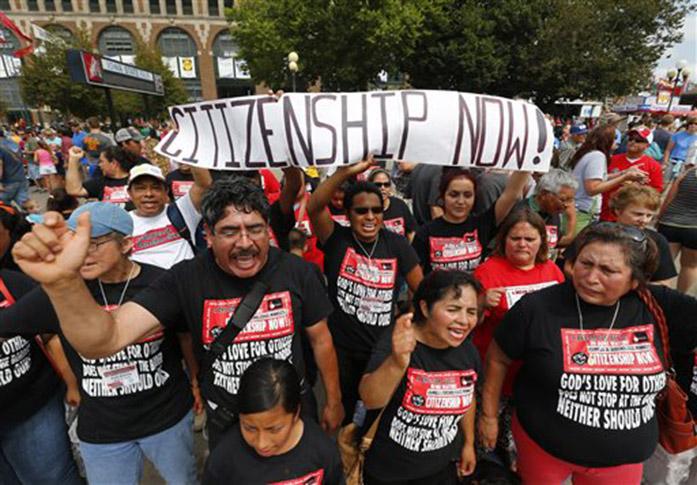At the focal point of the Iowa State Fair’s political soapbox, Republican heavyweight contenders Sen. Marco Rubio, R-Fla., and Donald Trump squared off on the
topic that is turning into the major talking point of the GOP presidential campaign: immigration. The man whose hair befuddles the masses announced his ambitions to end naturalization processes for immigrants, particularly the children of undocumented workers, while Rubio claims to oppose that position.
In Florida, which Rubio represents, 19.5 percent of the population is foreign-born, according to the Pew Research Center, ranking fourth nationally and two spots behind New York with 22.7 percent. Both of these hopefuls are not strangers to steady immigration into their respective states.
In Des Moines, the birthright-citizenship debate became one of many contentious issues in the GOP. The Candidate Who Must Not Be Named reinforced his hardline stance against immigration, especially from our neighbors to the south. However, his rhetoric further vilified those immigrant workers, alienating a significant portion of the country he aspires to represent.
 According to the Migration Policy Institute, Trump’s hometown of New York City is the home to the eighth-highest Mexican immigrant population in the country with 316,000 residents, ranking behind metropolitan areas such as Los Angeles and Chicago, with 1.75 million and 677,000 Mexican immigrants, respectively.
According to the Migration Policy Institute, Trump’s hometown of New York City is the home to the eighth-highest Mexican immigrant population in the country with 316,000 residents, ranking behind metropolitan areas such as Los Angeles and Chicago, with 1.75 million and 677,000 Mexican immigrants, respectively.
Though Mexican immigrants may only account for 1.7 percent of the sprawling New York City metropolis, the business mogul wishes to drastically marginalize undocumented immigrant workers, dehumanizing their status in what is anecdotally referred to as the most influential nation in the world. With an established value just over $4 billion by Forbes, Trump has consistently denied his use of undocumented workers in assembling his property empire, as evidenced by recent Daily Beast and Reuters investigations.
Overseas in the United Kingdom, anti-immigration rhetoric has become a staple in the likes of the Conservative Party, namely David Cameron — who wishes to amend the UK’s relationship in the European Union, attempting to effectively shut down the country’s borders to immigration. Such political figures fear the economic disadvantages an influx of immigrant workers would bring to their native population.
However, in the UK, 11 percent of the entire National Health Care Service staff is non-British, while 14 percent of clinical staff and 26 percent of doctors are foreign-born, according to statistics obtained last year from the Health and Social Care Information Centre by *The Guardian*. Furthermore, University College London released a study in 2013 finding that despite the non-European immigrant workforce growing over 2.2 million in Europe between 1992 and 2011, that same workforce contributed £8.8 billion more to the Treasury than they took.
 Immigrants are not siphoning money from the European economy and its people, and they are not doing so here. According to the U.S. Bureau of Labor Statistics, foreign-born workers were earning 81 percent that of the native-born workforce in 2014. Immigrants, from the workers to their children, help sustain our free-market enterprise (particularly under the top-down model that facilitates Trump’s earnings) and create the diverse vibrancy this country has thrived and will thrive upon.
Immigrants are not siphoning money from the European economy and its people, and they are not doing so here. According to the U.S. Bureau of Labor Statistics, foreign-born workers were earning 81 percent that of the native-born workforce in 2014. Immigrants, from the workers to their children, help sustain our free-market enterprise (particularly under the top-down model that facilitates Trump’s earnings) and create the diverse vibrancy this country has thrived and will thrive upon.
Trump wishes to directly contend the 14th Amendment; he denies the economic benefit of immigrant workers in conjunction with challenging the traditional naturalization interpretation of the Constitution. The state of Texas has piggybacked on this movement by denying birth certificates to the children of undocumented workers, according to an Al Jazeera article last week. Such reactionary gestures by a Republican candidate and a traditionally conservative state depict the societal marginalization of the immigrant workforce, and it turns those individuals and families into second-class citizens.
All of this is not to say that the United States should accept any and all immigrants. Trump’s meteoric rise is fueled by a clear anger among many Americans on current immigration trends, and we must make sure a pathway to citizenship for undocumented immigrants doesn’t come at the expense of those who are already here. But the data simply don’t support the argument that immigrants are detrimental to our economy, as certain presidential candidates suggest.




